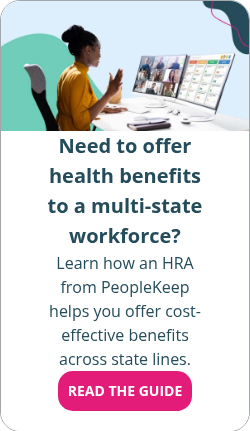Health insurance for employees in multiple states
By Elizabeth Walker on February 3, 2025 at 3:15 PM
Today, employers have access to tools that enable them to hire a remote workforce from all over the U.S. The ability to hire employees from multiple states is great for recruiting efforts and growing your business. But having multi-state employees can make offering health coverage to your staff challenging.
Not all health insurance companies have the same network coverage in every state. Even if a carrier provides plans in multiple states, their networks may vary, and employees in different states may have limited provider options. But, there are comprehensive health benefits you can offer your employees regardless of where they live.
In this blog post, you’ll learn:
- Four main options for providing health insurance to employees in multiple states.
- The pros and cons of each coverage option based on your budget and workforce.
- Key factors to consider when making an informed decision about multi-state health benefits.
1. National group health insurance plans
Your first option is a national group health plan. These multi-state plans are available to employees all over the U.S. and save you from having to manage different plans in each state.
National group health plans also eliminate the need to track multiple states’ rules, notifications, and underwriting guidelines. All employees receive the same group health insurance regardless of where they live. With a national plan, no one misses out on comprehensive coverage.
A significant downside is that few health insurance companies offer multi-state plan options. So, if you want a national group health plan, you’ll likely have a limited selection of policies to choose from. You may also have to pay a higher premium.
2. State health insurance plans
Another option is offering your staff separate state plans based on their location. State plans allow employees to receive essential coverage tailored to their area, needs, and preferences.
Your plan options will vary depending on which insurers offer coverage in each state. You also want to make sure the plan provides enough value. You can check the network of providers under each plan option to ensure your employees have enough variety.
A good place for small businesses to get started is the Small Business Health Options Program (SHOP) Marketplace. SHOP is a federal government program that helps small business owners with fewer than 50 employees (or up to 100 employees in some states) provide affordable health insurance coverage to their employees.
If you enroll in a SHOP plan in the state where your primary business site resides, you can offer your multi-state employees' SHOP coverage in two ways:
- Choose a single health plan for all employees.
- Remember to choose a medical plan with a multi-state or national provider network.
- Offer different SHOP coverage plans in each state where your employees work.
- As long as your business meets all requirements to take part in the state's SHOP, you can offer medical coverage even if you have one employee in a location.
While SHOP plans are available in most states, they often aren’t an option in locations with their own state-based health insurance exchange. Another downside is that many employers can find managing multiple separate state plans complicated and time-consuming.
3. Self-funded group health insurance
Another option is a self-insured group health plan. Also known as a self-funded plan, this type of insurance allows you to create and manage your own group health plan. In the process, you’re responsible for the financial risk of providing coverage to your employees, including handling claim payouts, administrative expenses, and other fees. If you want to control your financial liability, you can buy stop-loss coverage.
Self-funded group plans give you more flexibility than fully-insured plans. You’re not bound by an insurance company’s plan designs so you can craft a benefit that works best for you and your staff.
Want to learn more about how self-funded plans differ from fully-insured plans? Read our blog.
4. Health reimbursement arrangements (HRAs)
Instead of the options above, you can break free from group health insurance with a health reimbursement arrangement (HRA). With an HRA, employers can reimburse their employees tax-free for qualified out-of-pocket healthcare costs—including individual health insurance premiums—regardless of the employee’s geographical location. You set a monthly allowance and reimburse your staff tax-free up to their allowance amount after they incur an eligible expense.
HRAs are tax-advantaged for both business owners and employees. Reimbursement amounts are tax-deductible and free of payroll taxes for employers. They’re also income-tax-free for employees.
Below are two types of HRAs you can leverage to build a multi-state health benefit:
- The individual coverage HRA (ICHRA) is for businesses of any size. It can cover individual plan premiums and other out-of-pocket expenses. ICHRAs have no minimum or maximum contribution limits, and employers can personalize allowances and eligibility by employee class. Employees can opt in or out of the benefit. But, if they want to participate, they must have a qualifying form of individual health insurance coverage to use the benefit.
- Applicable large employers (ALEs) can also use an ICHRA to satisfy the Affordable Care Act (ACA)’s employer mandate.
- With employee classes, employers can differ allowances and eligibility by state if they choose.
- The qualified small employer HRA (QSEHRA) is for small businesses with fewer than 50 full-time equivalent employees (FTEs). This type of HRA has annual maximum contribution limits but no minimum allowance requirements. Employees must have a health insurance plan with minimum essential coverage (MEC) to participate.
HRAs are an excellent way for employers to end the administrative headaches of traditional health insurance while offering a comprehensive health benefit. For a multi-state workforce, a QSEHRA or ICHRA allows employees access to the best local network providers and policy options in their area.
Is an ICHRA or QSEHRA better for your business? Check out how they compare.
4. Health stipends
The last way to provide personalized health benefits to your workers in different states is with a health insurance stipend. Health stipends are a fixed amount of money employers offer employees to pay for their health insurance premiums and other out-of-pocket medical costs.
Stipends are customizable to meet every employer’s needs and budget. Because the IRS doesn’t consider them a formal health benefit, they aren’t subject to as many compliance regulations as other employee health benefits. So, they’re often simpler for many employers to administer.
Here are some key features of health stipends:
- You can offer a stipend as an annual lump sum, spot bonus, or as an allowance distributed regularly, such as monthly or quarterly.
- Using a reimbursement model, you can reimburse your employees for medical care after they incur a healthcare expense. Businesses must pay payroll tax on the reimbursements, and employees pay income taxes on the amount.
- Any type of employee can receive a stipend, including a 1099 contractor or international worker.
- Stipends don’t interfere with an employee’s ability to receive premium tax credits. This differs from a QSHERA, where they must reduce their premium tax credit by their allowance amount, or an ICHRA, which requires them to opt out to collect their subsidy.
- A health stipend is an excellent option for organizations with employees who have healthcare sharing ministries, as these types of plans don’t work with HRAs.
Because a health stipend isn’t a formal health benefit, it won’t satisfy the ACA’s employer mandate. You also can’t legally require your employees to buy a health policy with their stipend or ask for proof that they did so.
What you should consider before choosing a multi-state health benefit
The health benefit you select for your multi-state workforce will depend on your budget, carrier and network options, and employee needs. But there are a few essential tips you need to consider when looking for health insurance that will work in multiple states or ZIP codes.
A few things you should keep in mind are:
- Your employees’ geographic location. If you’re considering offering a group plan, always look at the geography of the health insurance policy. Just because a policy or health insurer is in multiple states doesn’t mean it will work in the states you need or cover all your employees’ healthcare.
- The premium. If you want a multi-state plan, you may have to pay a higher monthly premium. When budgeting, know your premium costs beforehand and how much your employees will pay.
- If you offer an HRA or stipend, you’ll have more control over your health budget by setting an allowance amount that works for you and your staff.
- How the coverage varies. If you have a health insurance plan in multiple states, understand how the coverage changes from place to place. This is especially vital if you’re an ALE subject to the employer mandate. Under the ACA, qualified health plans must pay at least 60% of the total cost of healthcare services for the standard population. It also must include coverage for physician and inpatient hospital services.
- With an HRA or stipend, employees can use their allowance to buy the individual health insurance plan in their area that’s best for them. All plans on a public exchange are ACA-compliant and cover essential health benefits. Many private exchange plans also comply with ACA requirements.
Conclusion
You have several attractive options when offering health insurance benefits to your employees in different states. The right choice for your organization will depend on your budget, coverage preferences, and other factors. But innovative solutions like an HRA or stipend are your best bet if you’re looking to support your entire workforce flexibly.
Whether you have workers in a single office or nationwide, PeopleKeep can help! Our health benefits software solutions can help you administer an HRA or health stipend so you can offer an attractive multi-state benefits package. Contact us today, and we’ll get you started.
This article was originally published on January 20, 2020. It was last updated on February 3, 2025.
Check out more resources
See these related articles

Can I offer a health insurance stipend?
Thinking about offering a health insurance stipend? Learn how it works, when it’s allowed, and why HRAs may be a more compliant alternative for employers.

What is healthcare reimbursement?
Looking to reimburse your employees for their healthcare expenses? Learn everything you need to know about healthcare reimbursement.

15 individual coverage HRA (ICHRA) FAQs
If you’re new to ICHRAs, don’t worry! This blog answers 15 FAQs employers have about ICHRAs to help you understand how it can benefit your employees.



